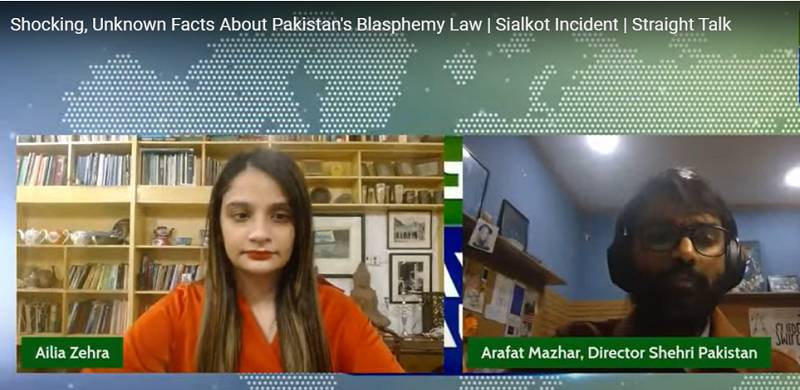
Activist Arafat Mazhar, who has researched the origin of Pakistan’s blasphemy laws, pointed out that in Islam blasphemy laws do not apply to non-Muslims and that Muslims accused of blasphemy should get the opportunity to defend themselves so the possibility of forgiveness remains open and mob violence can be avoided.
While speaking during a show on Naya Daur Media about the Sialkot lynching and the need for counter-extremism measures, Mazhar talked about the history of Pakistan’s blasphemy laws and what needs to be done in order to curb mob violence and eradicate radicalization from society.
https://www.youtube.com/watch?v=cmSpwuZgo8A&t=1483s
Mazhar is of the opinion that extrajudicial violence was linked to the law itself and the nature of the legislation leaves it open to misuse. He explained that the law was designed to encourage mob violence against blasphemy accused.
He added that religious parties blame the weakness of the judicial process for instances of mob violence linked to blasphemy allegations and validate such incidents.
Further, he said that the blasphemy law was made by the British and the clause about malicious intent was deliberately excluded from the legislation, which has directly resulted in instances of mob violence. The person who levels blasphemy allegations is bound to prove malicious intent, but this part is not taken into account during blasphemy trials.
Mazhar said that Pakistan’s own Federal Shariat Court has ruled that the presence of malicious intent is necessary to punish someone under this law but this stipulation is missing from the law itself. He emphasised that the law can only be applied to Muslims and they too should be given full opportunity to defend themselves.
While answering a question about the steps that need to be taken in order to deter mob violence, Mazhar said that statements condemning such behaviour need to be issued from the high state offices. He added that statements from Ulema, including Mufti Rafi Usmani and Taqi Usmani, exist which say that this is a pardonable law and such narratives need to be brought forward.
He also said that state and civil society needs to raise public awareness through arts, films, historical narratives, etc. in order to deradicalize society. He added that we need legislation that specifically targets the misuse of the blasphemy law.
Mazhar added that conversations need to be held at college campuses in order to curb the growing of radicalization in society.
While speaking during a show on Naya Daur Media about the Sialkot lynching and the need for counter-extremism measures, Mazhar talked about the history of Pakistan’s blasphemy laws and what needs to be done in order to curb mob violence and eradicate radicalization from society.
https://www.youtube.com/watch?v=cmSpwuZgo8A&t=1483s
Mazhar is of the opinion that extrajudicial violence was linked to the law itself and the nature of the legislation leaves it open to misuse. He explained that the law was designed to encourage mob violence against blasphemy accused.
He added that religious parties blame the weakness of the judicial process for instances of mob violence linked to blasphemy allegations and validate such incidents.
Further, he said that the blasphemy law was made by the British and the clause about malicious intent was deliberately excluded from the legislation, which has directly resulted in instances of mob violence. The person who levels blasphemy allegations is bound to prove malicious intent, but this part is not taken into account during blasphemy trials.
Mazhar said that Pakistan’s own Federal Shariat Court has ruled that the presence of malicious intent is necessary to punish someone under this law but this stipulation is missing from the law itself. He emphasised that the law can only be applied to Muslims and they too should be given full opportunity to defend themselves.
While answering a question about the steps that need to be taken in order to deter mob violence, Mazhar said that statements condemning such behaviour need to be issued from the high state offices. He added that statements from Ulema, including Mufti Rafi Usmani and Taqi Usmani, exist which say that this is a pardonable law and such narratives need to be brought forward.
He also said that state and civil society needs to raise public awareness through arts, films, historical narratives, etc. in order to deradicalize society. He added that we need legislation that specifically targets the misuse of the blasphemy law.
Mazhar added that conversations need to be held at college campuses in order to curb the growing of radicalization in society.

